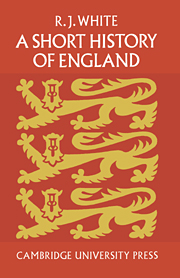Book contents
- Frontmatter
- Preface
- Contents
- Introduction: On the Character of English History
- 1 Roman Britain
- 2 Saxon England
- 3 The Anglo-Norman State
- 4 Common Law and Charter
- 5 The High Middle Ages
- 6 The Nation-State
- 7 The first Elizabethan Age
- 8 The Civil War
- 9 The Withdrawing Roar
- 10 The Century of Success
- 11 The first British Empire
- 12 The Age of Everything
- 13 War and Peace
- 14 Victorian Ages
- 15 Imperial and Edwardian
- Postscript
- Further Reading
- Index
6 - The Nation-State
Published online by Cambridge University Press: 14 November 2009
- Frontmatter
- Preface
- Contents
- Introduction: On the Character of English History
- 1 Roman Britain
- 2 Saxon England
- 3 The Anglo-Norman State
- 4 Common Law and Charter
- 5 The High Middle Ages
- 6 The Nation-State
- 7 The first Elizabethan Age
- 8 The Civil War
- 9 The Withdrawing Roar
- 10 The Century of Success
- 11 The first British Empire
- 12 The Age of Everything
- 13 War and Peace
- 14 Victorian Ages
- 15 Imperial and Edwardian
- Postscript
- Further Reading
- Index
Summary
There is no obvious reason why the dates marking a century should coincide with the beginning or the end of a distinctive epoch in a nation's life. D'Alembert, writing at the middle of the eighteenth century, thought that mid-century marks were more appropriate for punctuating the history of modern Europe. The capture of Constantinople by the Turk (1453); the climax of the Reformation with the Peace of Augsburg (1555); the Peace of Westphalia (1648); the publication of the first volume of the Encyclopaedia of Diderot and D'Alembert (1751); all these events might seem to bear him out. In the history of England, 1455 marked the beginning of the Wars of the Roses. Precisely 100 years later, Mary Tudor set about burning Protestants at Smithfield, thereby ensuring that England should be an anti-Catholic country and the enemy of Spain. It is here rather than in 1485, let alone 1500, that the next chapter in our history opens. By taking her place irrevocably in Protestant Europe, and in her alienation from the Spanish orbit, England became Great Britain and a world power. ‘What was shaping itself in the northern seas’, Maitland wrote, ‘already looked ominously like a Protestant Great Britain. Two small Catholic powers traditionally at war with each other, the one (England) a satellite of the Hapsburg luminary, the other (Scotland) a satellite of France, seemed to be fusing themselves in one Power that might be very great… A new nation, a British Nation, was in the making.’
- Type
- Chapter
- Information
- A Short History of England , pp. 102 - 120Publisher: Cambridge University PressPrint publication year: 1967



